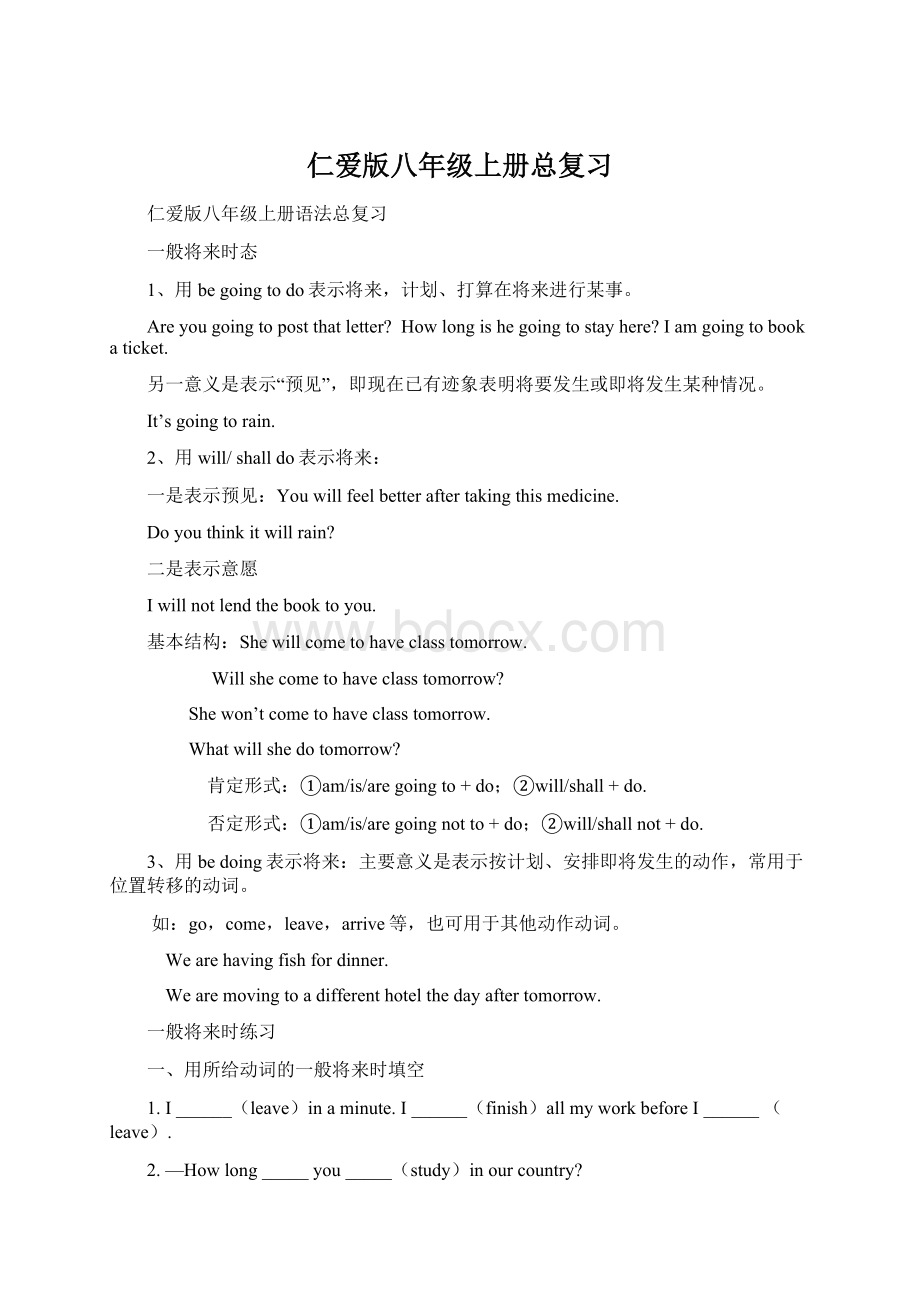仁爱版八年级上册总复习.docx
《仁爱版八年级上册总复习.docx》由会员分享,可在线阅读,更多相关《仁爱版八年级上册总复习.docx(18页珍藏版)》请在冰豆网上搜索。

仁爱版八年级上册总复习
仁爱版八年级上册语法总复习
一般将来时态
1、用begoingtodo表示将来,计划、打算在将来进行某事。
Areyougoingtopostthatletter?
Howlongishegoingtostayhere?
Iamgoingtobookaticket.
另一意义是表示“预见”,即现在已有迹象表明将要发生或即将发生某种情况。
It’sgoingtorain.
2、用will/shalldo表示将来:
一是表示预见:
Youwillfeelbetteraftertakingthismedicine.
Doyouthinkitwillrain?
二是表示意愿
Iwillnotlendthebooktoyou.
基本结构:
Shewillcometohaveclasstomorrow.
Willshecometohaveclasstomorrow?
Shewon’tcometohaveclasstomorrow.
Whatwillshedotomorrow?
肯定形式:
①am/is/aregoingto+do;②will/shall+do.
否定形式:
①am/is/aregoingnotto+do;②will/shallnot+do.
3、用bedoing表示将来:
主要意义是表示按计划、安排即将发生的动作,常用于位置转移的动词。
如:
go,come,leave,arrive等,也可用于其他动作动词。
Wearehavingfishfordinner.
Wearemovingtoadifferenthotelthedayaftertomorrow.
一般将来时练习
一、用所给动词的一般将来时填空
1.I______(leave)inaminute.I______(finish)allmyworkbeforeI______(leave).
2.—Howlong_____you_____(study)inourcountry?
—I_____(plan)tobehereforaboutonemoreyear.
—I_____(hope)tovisittheotherpartsofyourcountry.
—What______you______(do)afteryou______(leave)here?
—I______(return)homeand______(get)ajob.
3.I______(be)tired.I______(go)tobedearlytonight.
4.Mary’sbirthdayisnextMonday,hermother_____(give)herapresent.
5.Itisverycoldthesedays.It______(snow)soon.
6.—_____you_____(be)herethisSaturday?
—No.I______(visit)myteacher.
7.—______I______(get)youacopyoftoday’snewspaper?
—Thankyou.
8.Iamafraidthere______(be)ameetingthisafternoon.Ican’tjoinyou.
9.Mike______(believe,not)thisuntilhe______(see)itwithhisowneyes.
10.Mostofusdon’tthinktheirteam______(win).
二、单项选择
()1.There__________ameetingtomorrowafternoon.
A.willbegoingto B.willgoingtobeC.isgoingtobe D.willgotobe
()2.Charlie________herenextmonth.
A.isn’tworking B.doesn’tworkingC.isn’tgoingtoworking D.won’twork
()3.He________verybusythisweek,he________freenextweek.
A.willbe;is B.is;is C.willbe;willbe D.is;willbe
()4.There________adolphinshowinthezootomorrowevening.
A.was B.isgoingtohaveC.willhave D.isgoingtobe
()5.–________you________freetomorrow?
–No.I________freethedayaftertomorrow.
A.Are;goingto;will B.Are;goingtobe;willC.Are;goingto;willbe D.Are;goingtobe;willbe
()6.Mother________meanicepresentonmynextbirthday.
A.willgives B.willgive C.gives D.give
()7.–ShallIbuyacupofteaforyou?
–________.(不,不要。
)
A.No,youwon’t B.No,youaren’t.C.No,pleasedon’t D.No,please.
()8.–Whereisthemorningpaper?
–I________itforyouatonce.
A.get B.amgetting C.toget D.willget
()9.________aconcertnextSaturday?
A.Therewillbe B.WilltherebeC.Therecanbe D.Thereare
()10.Iftheycome,we________ameeting.
A.have B.willhaveC.had D.wouldhave
()11.He________herabeautifulhatonhernextbirthday.
A.gives B.gave C.willgiving D.isgoingtogive
()13.He________inthreedays.
A.comingback B.camebackC.willcomeback D.isgoingtocomingback
()14.Ifit________tomorrow,we’llgoroller-skating.
A.isn’train B.won’train C.doesn’train D.doesn’tfine
()15.–WillhisparentsgotoseetheTerraCottaWarriorstomorrow?
–No,________(不去).
A.theywilln’t B.theywon’t. C.theyaren’t D.theydon’t.
()16.Who________we________swimmingwithtomorrowafternoon?
A.will;go B.do;go C.will;going D.shall;go
()18.Tomorrowhe________akiteintheopenairfirst,andthen________boatinginthepark.
A.willfly;willgo B.willfly;goesC.isgoingtofly;willgoes D.flies;willgo
20.There________abirthdaypartythisSunday.
A.shallbe B.willbe C.shallgoingtobe D.willgoingtobe
()21.They________anEnglisheveningnextSunday.
A.arehaving B.aregoingtohaveC.willhaving D.isgoingtohave
()22.________you________freenextSunday?
A.Will;are B.Will;be C.Do;be D.Are;be
()23.He________thereattentomorrowmorning.
A.will B.is C.willbe D.be
()24.________yourbrother________amagazinefromthelibrary?
A.Are;goingtoborrow B.Is;goingtoborrowC.Will;borrows D.Are;goingtoborrows
()25.–ShallIcomeagaintomorrowafternoon?
–________(好的).
A.Yes,please B.Yes,youwill. C.No,please D.No,youwon’t.
()26.It________theyearofthehorsenextyear.
A.isgoingtobe B.isgoingto C.willbe D.willis
()27.________openthewindow?
A.Willyouplease B.Pleasewillyou C.Youplease D.Doyou
()28.–Let’sgoouttoplayfootball,shallwe?
–OK.I________.
A.willcoming B.begoingtocome C.come D.amcoming
()29.It________usalongtimetolearnEnglishwell.
A.takes B.willtake C.spends D.willspend
()30.Thetrain________at11.
A.goingtoarrive B.willbearrive C.isgoingto D.isarriving
初中英语过去进行时专项语法讲解
(一)定义
过去进行时,是表示过去某个具体时刻正在进行的事情或动作。
(二)结构
was/were+doing(现在分词)
(三)用法
1、过去进行时表示过去某段时间内持续进行的动作或者事情。
常用的时间状语thismorning,thewholemorning,alldayyesterday,fromninetotenlastevening,when,while例如:
WewerewatchingTVfromseventoninelastnight.
昨天晚上七点到九点的时候我们在看电视。
WhatwasheresearchingalldaylastSunday?
上周日他一整天都在研究什么?
Mybrotherfellwhilehewasridinghisbicycleandhurthimself.
我哥哥骑自行车的时候从车上摔下来,受伤了。
Itwasrainingwhentheyleftthestation.
他们离开车站的时候天正在下雨。
WhenIgottothetopofthemountain,thesunwasshining.
当我到达山顶的时候,阳光灿烂。
2.过去进行时可以表示在过去某个时间点发生的事情。
时间点可以用介词短语、副词或从句来表示。
如:
Whatwasshedoingatnineo'clockyesterday?
昨天晚上九点她在做什么?
(介词短语表示时间点)
WhenIsawhimhewasdecoratinghisroom.
当我看见他的时候他正在装饰房间。
(when从句表示时间点)
3. 在复合句中,如果主要动作和背景动作都是延续的或同时发生的,那么主从句的动词都可用过去进行时。
例如:
Whilehewaswaitingforthebus,hewasreadinganewspaper.
他边等车边看报。
(两个动作都是延续的)
HewascleaninghiscarwhileIwascooking.
他擦车时我在做饭。
(两个动作同时进行)
4. 通常不能用于过去进行时的动词主要有:
agree,be,believe,belong,care,forget,hate,have(拥有),hear,know,like,love,mean,mind,notice,own,remember,seem,suppose,understand,want,wish等。
例如:
误:
Iwasknowingtheanswer.
正:
Iknewtheanswer.我知道答案。
误:
Iwasn'tunderstandinghim.
正:
Ididn'tunderstandhim.我不明白他的意思。
典型例题:
1)Mary___adresswhenshecutherfinger.
A.made B.ismaking C.wasmaking D.makes
答案C.割伤手指是已发生的事情,应用过去时。
同时,when表时间的同时性,“玛丽在做衣服时”提供事情发生的背景,因此用过去进行时。
2)Asshe___thenewspaper,Granny___asleep.
A.read;wasfalling B.wasreading;fell C.wasreading;wasfalling D.read;fell
答案B.句中的as=when,while,意为"当……之时"。
描述一件事发生的背景时,用过去进行时;一个长动作发生的时候,另一个短动作发生。
句意为"在她看报纸时,奶奶睡着了。
"句中的fell(fall的过去时),是系动词,后跟形容词,如:
fallsick。
(四)过去进行时和一般过去时的区别
1.一般过去时叙述旧事,过去进行时描述背景。
A、一般过去时
1)叙述过去状态、动作或事件
HewenttoBeijinglastSunday.(带具体时间)
2)表示过去的习惯
a)usedto
usedto表一贯性有规律的习惯
Theyusedtomeet
Hesmokedalottwoyearsago.(过去行为)
Usedto表今昔对比的含义。
Sheisn'twhatsheusedtobe.(今昔对比)
c)表示状态时一般只用usedto
Tomusedtobefat/Thereusedtostandatreethere.(状态)
B.过去进行时
-表示在过去某阶段或某一时刻正在发生
Whatwereyoudoingat8:
30lastnight?
(过去某时刻正在发生)
-与always,often,usually等连用表喜爱,讨厌等感情色彩。
HewasalwaysChanginghismind.
2、过去进行时与一般过去时的区别
A.进行时表某一行为的“片断”一般时表示行为的“整体”和存在的状态。
Iwasreadingthebookatthattime.(未读完,“读”的片段)Ireadthebookyesterday.(已读完,表整个“读”)
B、一般持续时间状语多与进行时连用
Itwasrainingallnight.(优先用wasraining,rained为持续动词,故也可使用)
Hewaswritingaletterthewholeofafternoon.(短暂动词与持续时间连用,表反复,连续发生,不可用一般过去时)
C、while时间状语从句中用短暂动词时只能用进行时。
例:
Hebrokeachairwhilehewasjumpingupanddown.
D、While所在主从句动作大致持续相等时主从句一般都用进行时,但若是持续动词可都用一般过去时,两个动作一长一短时短的用一般过去时,长的用进行时。
Iwascookingthedinnerwhilehewasplayingthepiano.(平行)IsawhimwhileIwaswalkingtothestation.
3、英语中有四类动词一般不用进行时(不用现在进行时和过去进行时)
1)表心理状态、情感的动词,如love,hate,like,care,respect,please,prefer,know等。
2)表存在、状态的动词,如appear,exist,lie,remain,stand,seem等
3)表感觉的动词,如see,hear,feel,smell,sound,taste等.
4)表一时性的动词,如accept,allow,admit,decide,end,refuse,permit,promise等。
5、例题
考题1Asshe____thenewspaper,Granny____asleep.(95)
A.read/wasfallingB.wasreading/fell
C.Wasreading/wasfallingD.read/fell
分析时间从句的动作长,而“入睡”动作短,故前者用过去进行时,而较短动词用一般过去时,选B
考题2Tom___intothehousewhennoone___.
A.slipped/waslookingB.Hadslipped/looked
C.slipped/hadlookedD.wasslipping/looked
分析此题先要理解好when,表“此时”,说明主句中slipped是较短行为,而look是较长行为的片断,即汤姆溜进房子,此时没人瞧见,故选A为正确。
时态比较
过去进行时与一般过去时:
都强调过去发生的事,进行时强调过程,不一定完成,过去时强调事件,一定完成。
过去进行时与一般过去时,两者都表示过去发生的动作,但过去进行时表示在过去某一特定的时间点或时间段正在进行的动作,而一般过去时表示在过去时间完成的动作。例如:
Iwastypingaletterlastnight.昨晚我在打一封信。(可能没打完)
Itypedsomeletterslastnight.我昨晚打了一些信。(已经打完)
1、一般过时往往表示某一动作已经完成,而过去进行时却表示动作在持续或未完成。
Shewrotealettertoherfriendlastnight.她昨晚给朋友写了封信。
(信写完了)
Shewaswritingalettertoherfriendlastnight.她昨晚一直在给朋友写信。
(信不一定写完)
2、一般过去时表示只做一次动作,而过去进行时却表示动作反复地进行。
Shewavedtome.她朝我挥了挥手。
3、句中有amomentago、in1990、yesterday之类的表示过去的时间短语一般用一般过去时。
4、句中有atthistimelastSunday,f